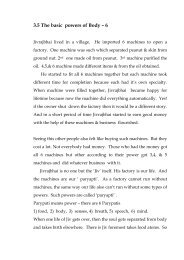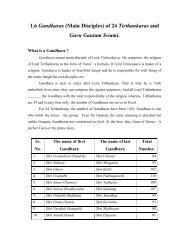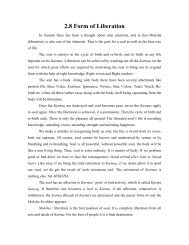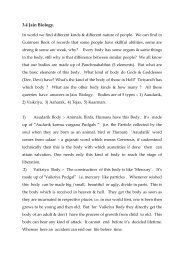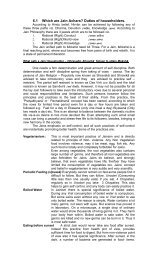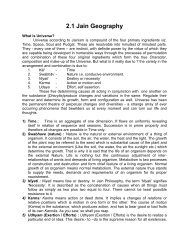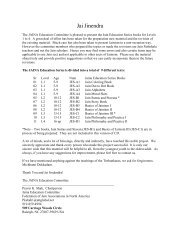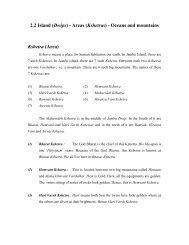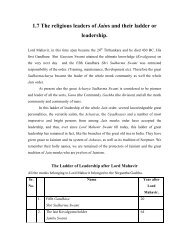Paryushan Parva - Jainism, Jain Religion - colleges
Paryushan Parva - Jainism, Jain Religion - colleges
Paryushan Parva - Jainism, Jain Religion - colleges
Create successful ePaper yourself
Turn your PDF publications into a flip-book with our unique Google optimized e-Paper software.
Pratikraman in English with Meaning<br />
Going Back to the Path of Purification<br />
SECTION I - BACKGROUND<br />
<strong>Paryushan</strong> <strong>Parva</strong><br />
The word “<strong>Parva</strong>” means auspicious day. There are three types of auspicious days - 1. Ordinary<br />
(Sämänya) like every third day -beej (2nd), päncham (5th), etc., 2. Incidental (Naimitik) like<br />
Mahävir Jayanti (Birthday) and 3. Natural (Naisargik) like <strong>Paryushan</strong>. The word “<strong>Paryushan</strong>” has<br />
several different meanings: 1. Pari + ushan = all kinds + to burn = to burn (shed) our all types of<br />
karmäs 4 . To shed our karmäs, we do twelve different types of austerities including fasting. 2.<br />
Another meaning of “ushan” is to stay closer. To stay closer to our own soul from all directions and<br />
to stay absorbed in our own-self (soul), we do Svädhyäya 5 (self-study), meditation, austerities, etc.,<br />
and 3. Pari + upshamanä = upshamanä means to suppress, to suppress our passions (kashäyas -<br />
anger, ego, deceit and greed) from all directions.<br />
Therefore, the real purpose of the <strong>Paryushan</strong> is to purify our soul by staying closer to our own soul,<br />
to look at our own faults, to ask for forgiveness for the mistakes we have committed, and take vows<br />
to minimize our faults. We try to forget about the needs of our body (like food) and our business so<br />
that we can concentrate on our-self.<br />
To ask for forgiveness is the toughest thing to do. Therefore, our great Ächäryas 6 have said:<br />
“Kshamä Viram Bhushanam, Kshamäväni Michchhä Mi Dukkadam” - To ask for forgiveness is a<br />
great quality of the brave ones and if I have committed any mistake, knowingly or unknowingly, I<br />
ask for your forgiveness.<br />
There are several great aphorisms (Sutras) to ask for forgiveness with the unity of the body, speech<br />
and mind, and one of them is as follows:<br />
Khämemi Savve Jivä, Savve Jivä Khamantu Mi<br />
Mitti Me Savva bhuesu, Veram majjham na Kenai.<br />
Meaning: I forgive all the living beings of the universe, and may all the living-beings forgive me for<br />
4 Karman particles (non-living, very subtle substance) are attracted to the soul because of false belief (Mithyättva),<br />
vowlessness (non-abstinence) (Avirati), negligence (Pramäda), passions (Kashäya) and Activities (Yogäs). These<br />
Karman particles that are attached to the soul are called karma. Karma is the hindrance (obstacle) that does not allow us<br />
to realize the true qualities of ätmä<br />
5 Svädhyäya is one of the six internal tapas and one of the six daily activities of the householder. Svädhyäya is consisted<br />
of five elements. (i) vächanä- reading of the <strong>Jain</strong> canonical books; (ii) pruchhanä- asking the guru questions about<br />
them; (iii) parivartanä- repetition of what was learned previously so one does not forget; (iv) anuprekshä- deep<br />
contemplation of what was learned (with the meaning); (v) dharma-kathä- inspiring others about <strong><strong>Jain</strong>ism</strong> and listening<br />
to the exposition of religious parables. Great Ächärya Amitgati says, one cannot get rid off the darkness of his/her<br />
ignorance without the brightness of svädhyäya. Another great Ächärya Vamadeva says, svädhyäya is one of the four<br />
anuyogas propounded by the Jina. Ächärya Asadhara recommends the construction of svädhyäya-shäläs (schools)<br />
where there is no frequent visits by <strong>Jain</strong> monks and scholars.<br />
6 The message of Jina, Lord Mahdvira the last Tirthankara, is carried by Ächäryas, our spiritual leaders. They have 36<br />
attributes, (see the meaning of Panchindiya Sutra, Lesson 2 of Sämäyik). The responsibility of the spiritual welfare of<br />
the entire <strong>Jain</strong> Sangh (community) rests on the shoulders of Ächäryas. Before reaching this state, one has to do an indepth<br />
study and have a thorough mastery of the <strong>Jain</strong> Ägams. In addition to acquiring a high level of spiritual excellence,<br />
they also have the ability to lead the monastic communion. They should also know the various languages of the country<br />
and have acquired a sound knowledge of other philosophies, ideologies, and religions of the region and the world.<br />
5




